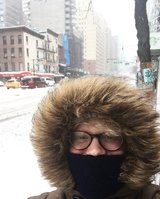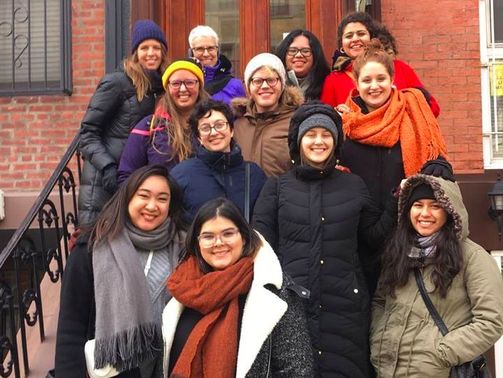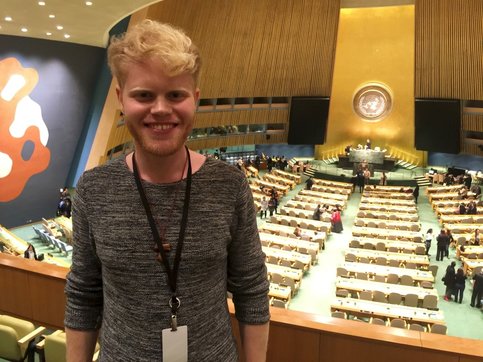 Glen braving the snow in Manhattan. Glen braving the snow in Manhattan. By Glen Bradley It has been just short of a month since this year’s Loretto Volunteer cohort went to the United Nations’ 2017 Commission on the Status of Women (CSW) in New York City. Our two and a half days of the Commission was packed with opportunity, with over 150 sessions (both by member states and NGOs) to choose from. Many of us had scouted out the sessions beforehand using their app and had a full schedule. With the weekend beforehand to explore the city and reconnect with the volunteers in the other cities, we began our week balancing personal interest with strategically going to sessions together. While the snow shut down and canceled all session for the Tuesday of our visit, we kept our spirits high and looked forward to making the most of our time in the city and the sessions we’d go to on Wednesday. I came to the CSW with two objectives: learn something that would inform my work in queer activism/advocacy and learn about an issue I had very little knowledge of. As the type to over-commit, I had filled each available time slot with a session on my calendar. Knowing I wouldn’t be able to go to each, I made a goal to attend at least one session a day that connected to queer issues somehow and another that didn’t but sounded like something I wouldn’t find outside of the CSW. The session that stood out the most was “Challenges and Achievements of LBT Women in the Workplace” because it covered the complex and intersectional realities of LB* women in each country. In this session, four panelists from around the world (Mexico, Fiji, China, and Lebanon) spoke on what types of workplaces were available to women in their countries and how cultural factors impacted LB women’s economic freedom. The panelist from Lebanon noted that while the session used “LBT women” (lesbian, bisexual, and transgender), the panel would primarily focus on LB (lesbian and bisexual) women. She shared how the LGBTQ+ movement in Lebanon has been dominated by gay men because they have easier access to economic resources. For those spaces specifically for LBT women, most are lead by LB women. As a result, the movement has lacked a strong intersectional approach toward LGBTQ+ empowerment leading to GB (gay and bisexual) men receiving more and quicker benefit from the movement as a whole, often without addressing issues that specifically impact LB and T women.
The panelist from China shared how many cisgender women in China, particularly rural areas, do not have the economic resources necessary to live with a same-gender partner because these women do not have access to paid work. Instead, they are expected and confined to caring for their household. Men who are attracted to men, however, do have the economic resources needed to live together because all men are expected to have paid work. Women attracted to women face more than structural patriarchy, the gender roles leave no room for them to live authentically. Women who break cultural norms and do find paid work still often lack economic freedom because the men in the household often take the money as men are expected to handle finances. In Mexico, women face sexism in education and in the workplace, affecting their economic freedom. But for women who are attracted to women, health care costs were an added burden. The panelist from Mexico presented data from a study she led showing that LB women in Mexico fear discrimination from public healthcare services and opt to pay for privatized care when the socialized healthcare is available. These women were also unaware that any such discrimination based on sexuality is illegal. With a majority relying on private healthcare, LB women spent more money on their health and has less money to spend on higher education and basic needs. The panelist from Fiji elaborated that since the culture in Fiji is dominated by religion, gender roles and sexuality norms are enforced by religion. Similar to China, women are expected to work for the household rather than pay. Breaking gender roles and sexuality norms lead to complete ostracization from family and the rest of their community. Like many sessions, this one intimately explained how women are affected by multiple factors that often compound barriers and dangers. Looking to my work in queer advocacy in the United States, this session made me more aware how similar intersectional realities exist in our own country and culture. In order to effectively advocate for queer people, I must continue educate myself on the diversity of my community and how queer issues are inherently impacted by intersectional issues. In order to advocate for the minorities in my queer community, I need to challenge the gay, male dominant spaces and organizations to actively include more input from and leadership by the minorities within our minority. I am extremely grateful to the Loretto Volunteer program for the experiences I had at the Commission and know that theses experiences will impact my future advocacy as I work for the rights and safety all queer people in my own country. Glen Bradley is from Kansas City, Missouri and graduated from Santa Clara University in 2016 with a Bachelor of Science in Commerce as a marketing major and English minor. Glen is currently working at Metro DC PFLAG.
0 Comments
Your comment will be posted after it is approved.
Leave a Reply. |
In Their Own WordsWe invite you to get to know Loretto Volunteers and the program here. Volunteers introduce themselves and reflect on their experiences. |



